A Tip of theToque to Ken, the Fifth String on the Banjo of Life:
Really?
Friday, March 27, 2009
All Things to All Men
As anyone who knows me or reads my blog knows, I'm incredibly fond of my home state, an equally proud of it -- despite my frustration with the political atmosphere here, it's a beautiful place, and outside the cities (especially Eugene and Portland), quite down-to-earth.
Also, despite what people think, Oregon, and the Northwest in general, is not one continual rainfall. One of the things that I've been proud of for quite some time, as it directly relates to the beauty of this place, is its incredible geological and climatic diversity, and the surprising way that diversity stacks Oregon up in comparison to other regions of the country.
I do not deny that there is beauty to be found across this great nation, nor do I imply we hold a monopoly on it. But what is amazing is the way in which so many diferent places in Oregon compare to so many different parts of the rest of the country. With the exception of a few very extreme examples (The Everglades, or the Grand Canyon, for instance), if you pick a specific place in America known for its geology, climate, and scenery, I can, with some effort, find somewhere in Oregon with similar features -- in some cases, admittedly, the Oregon version is a second-best copy, but in other cases, I'd happily stack Oregon up for comparison with confidence that we'd come out on top.
Let me give you a few examples. For copyright reasons, I am not posting any of the gorgeous pictures I found online here -- rather, I'm posting links and letting you see for yourself:
Hudson River Valley, New York
Columbia River Gorge, Oregon/Washington Border
Arizona's Painted Desert
Oregon's Painted Hills
The Blue Ridge Mountains
The Coast Range
A Maine Lighthouse
Oregon's Heceta Head Lighthouse
Grand Tetons, Wyoming
Wallowas, Oregon
Napa Valley, California
Willamette Valley, Oregon
See what I mean?
Also, despite what people think, Oregon, and the Northwest in general, is not one continual rainfall. One of the things that I've been proud of for quite some time, as it directly relates to the beauty of this place, is its incredible geological and climatic diversity, and the surprising way that diversity stacks Oregon up in comparison to other regions of the country.
I do not deny that there is beauty to be found across this great nation, nor do I imply we hold a monopoly on it. But what is amazing is the way in which so many diferent places in Oregon compare to so many different parts of the rest of the country. With the exception of a few very extreme examples (The Everglades, or the Grand Canyon, for instance), if you pick a specific place in America known for its geology, climate, and scenery, I can, with some effort, find somewhere in Oregon with similar features -- in some cases, admittedly, the Oregon version is a second-best copy, but in other cases, I'd happily stack Oregon up for comparison with confidence that we'd come out on top.
Let me give you a few examples. For copyright reasons, I am not posting any of the gorgeous pictures I found online here -- rather, I'm posting links and letting you see for yourself:
Hudson River Valley, New York
Columbia River Gorge, Oregon/Washington Border
Arizona's Painted Desert
Oregon's Painted Hills
The Blue Ridge Mountains
The Coast Range
A Maine Lighthouse
Oregon's Heceta Head Lighthouse
Grand Tetons, Wyoming
Wallowas, Oregon
Napa Valley, California
Willamette Valley, Oregon
See what I mean?
Tuesday, March 24, 2009
Change We Can No Longer Suspend Disbelief In
I've been watching with a mixture of sadness, fatalistic amusement, anger, and a bit of regretful vindication the Obama administration's handling of things, especially the financial crisis, and was inspired to create the following image:
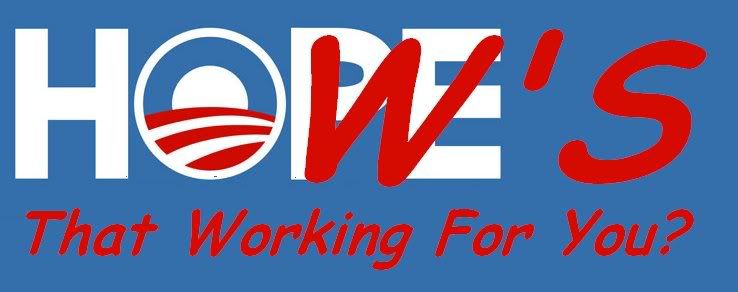
Saturday, March 21, 2009
What He Said
Robert the Llama Butcher has posted a YouTube video of Representative McCotter (R - Michigan) lambasting the Dems over the AIG flap. Go watch it -- I couldn't have summed up my own feelings on this any better.
Tuesday, March 17, 2009
Serendipity
I took a "What Beer Are You?" quiz, and guess what I scored? You, you guessed it:

Okay, we all know Guinness is the best possible score on any "What Kind Of Beer Are You" test, so you can just go on and pat yourself on the back now. Like the world's most famous brew, you're genuine, you've got good taste, and you're sophisticated. What else can I say, except congratulations?
If your friends didn't score the same way, get ready for them to say: Guinness is too heavy; it's an acquired taste; it's too serious--and they probably think those things about you at times. But just brush 'em off. Everybody knows Guinness is the best. Cheers.
A tip of the Toque to William Powell at The Bow Ramp.
Your result for The If You Were A Beer Test...
Guinness
(100% dark & bitter, 67% working class, 100% genuine)

Okay, we all know Guinness is the best possible score on any "What Kind Of Beer Are You" test, so you can just go on and pat yourself on the back now. Like the world's most famous brew, you're genuine, you've got good taste, and you're sophisticated. What else can I say, except congratulations?
If your friends didn't score the same way, get ready for them to say: Guinness is too heavy; it's an acquired taste; it's too serious--and they probably think those things about you at times. But just brush 'em off. Everybody knows Guinness is the best. Cheers.
Take The If You Were A Beer Test at
A tip of the Toque to William Powell at The Bow Ramp.
Monday, March 16, 2009
Self-Evident
A Tip of the Toque to Mike at South Texian:
You are a Free Marketeer, also known as a fiscal conservative. You believe in free-market capitalism, tax cuts, and protecting your hard-earned cash from pick-pocketing liberal socialists.
I'm not so sure I agree with the results -- I DO believe in the free market, but I also believe that it is merely a tool to be used to secure even more basic freedoms, and is itself dependent on other important freedoms in order to function properly. But I did my best to answer the questions frankly and accurately, and that's what came up, so there you go.
Pop Quiz
Four Questions:
1. Which of the two main presidential candidates, , during the election, claimed that "the fundamentals of the economy are strong", despite the current crisis?
2. What was his critics' response?
3. Which of those candidates is now maintaining that claim?
4. Which of them are we to believe?
1. Which of the two main presidential candidates, , during the election, claimed that "the fundamentals of the economy are strong", despite the current crisis?
2. What was his critics' response?
3. Which of those candidates is now maintaining that claim?
4. Which of them are we to believe?
Sunday, March 15, 2009
Qoute of the Day
"If Michelle Obama doesn't lay off all this "giving back" stuff pretty soon, she's going to find herself in Warren Buffett's tax bracket. "
- Ann Coulter
(A Tip of the Toque to Mike LaRoche at South Texian.
- Ann Coulter
(A Tip of the Toque to Mike LaRoche at South Texian.
Saturday, March 14, 2009
Monday, March 02, 2009
More Hopeychanginess
A Tip of the Toque to Phineas at Public Secrets.
Once again, a member of the administration of the President Who Will Clean Up Washington has some questions to answer regarding the ethics of his behavior.
Change We Can Believe In.
Once again, a member of the administration of the President Who Will Clean Up Washington has some questions to answer regarding the ethics of his behavior.
The man who is President Obama's newly minted urban czar pocketed thousands
of dollars in campaign cash from city developers whose projects he approved or
funded with taxpayers' money, a Daily News probe found.
Bronx Borough President Adolfo Carrion often received contributions
just before or after he sponsored money for projects or approved important
zoning changes, records show.
Most donations were organized and well-timed.
Change We Can Believe In.
Sunday, March 01, 2009
Das is Das Amore
As I've mentioned, my sister's genealogy research has confirmed our Celtic and Germanic ancestry -- German, English, Welsh, Scot, Irish, Swedish, with a smattering of Swiss and French.
But my favorite ethnic cuisine, hands down, is Italian (ok, not hands down -- well-made Mexican gives it a run for its money. As do Northwest cuisine and Barbecue, both of which are American and thus no what I consider "ethnic"). And I must say, I'm quite good at it. I even suggested a while back to TFR that maybe I should try my hand at it as my business. She demurred. Until tonight, when I made lasagna.
I started with a green bell bepper, 3/4 of a sweet yellow onion, and a couple stalks of celery, all fine diced. I sweated them in some olive oil along with a butt ton (that's 1.35 metric assloads for my readers outside the US). That went ito a big pot along with 30 oz. of tomato sauce and 6 oz. of tomato paste. Then I browned 1 lb of hamburger and 12 oz. ground pork along with more garlic, dried parsley, oregano, basil, salt, pepper, paprika, and powdered chili. I added this to my sauce, as well as the wine I used to deglaze the skillet. I also added some balsamic vinegar, fresh basil and fresh oregano, as well as more salt and pepper. Once it was ready, I latered sauce, ricotta, pasta, sauce, ricotta, pasta, sauce, ricotta, pasta, sauce, ricotta, pasta, sauce, mozzarella, covered it with foil and baked for 35 minutes, then removed the foul, added a little more mozz., parmesan, and baked it for 10 more minutes, then hit it with the broiler for 3 more, then let it cool and added more parmesan.
But my favorite ethnic cuisine, hands down, is Italian (ok, not hands down -- well-made Mexican gives it a run for its money. As do Northwest cuisine and Barbecue, both of which are American and thus no what I consider "ethnic"). And I must say, I'm quite good at it. I even suggested a while back to TFR that maybe I should try my hand at it as my business. She demurred. Until tonight, when I made lasagna.
I started with a green bell bepper, 3/4 of a sweet yellow onion, and a couple stalks of celery, all fine diced. I sweated them in some olive oil along with a butt ton (that's 1.35 metric assloads for my readers outside the US). That went ito a big pot along with 30 oz. of tomato sauce and 6 oz. of tomato paste. Then I browned 1 lb of hamburger and 12 oz. ground pork along with more garlic, dried parsley, oregano, basil, salt, pepper, paprika, and powdered chili. I added this to my sauce, as well as the wine I used to deglaze the skillet. I also added some balsamic vinegar, fresh basil and fresh oregano, as well as more salt and pepper. Once it was ready, I latered sauce, ricotta, pasta, sauce, ricotta, pasta, sauce, ricotta, pasta, sauce, ricotta, pasta, sauce, mozzarella, covered it with foil and baked for 35 minutes, then removed the foul, added a little more mozz., parmesan, and baked it for 10 more minutes, then hit it with the broiler for 3 more, then let it cool and added more parmesan.
Monday, February 23, 2009
Family History: That Wasn't What I Expected; Almost Famous; Robbo Would Not Be Pleased; That Would Explain My Love of Chocolate
My sister, being a full-time (but not quite Desperate) housewife and mother, has recently taken up researching our geaneology as a hobby, mostly through the web site Ancestry.com. She's managed to trace our ancestors back as far as the 16th century (the English Branch), and has dug up some fascinating stuff. Among our ancestors were early Pilgrim or Puritan settlers in Massachissetts (not Mayflower passengers, but within a few years, and giving birth in the colony by 1627), and victims of an infamous Massacre in Upstate New York during the Revolution. What I really found interesting were the following tidbits:
That Wasn't What I Expected:
I have always known I had German ancestry -- my surname, after all, is blatantly German, and my sister's research has confirmed my German Ancestry. But what surprised us was that our Patrilineal line was NOT German, despite the family name. In fact, the first of my ancestors born in America was also the first ancestor with that last name. His father, Hendrik Johansson, was born in Sweden, as was HIS father, Johan Hendriksson. Why my ancestor had the middle name Johansson and then the last name that our family now bears is a mystery -- my best guess is either he was orphaned and adopted or his mother remarried. But so far, we don't have any records that say one way or another -- this was in the
Almost Famous:
For a couple of generations, my mother's family has been convinced we were related to Daniel Boone -- there are, after all, several Boones in the family lineage, and from the right part of the country. But my sister's more detailed research has shown conclusively that we are not related to Daniel Boone on my mother's side. On my FATHER'S side, however, we ALMOST are -- my great-grandfather married a woman who was a great-granddaughter of Daniel Boone and a greanddaughter of Meriwether Lewis. Unfortunately for us, she was his second wife, and our family line is from his first marriage.
Robbo Would Not Be Pleased:
This part will dismay my Royalist friend over at TPSAYE: My sister has also discovered in her research that we are direct descendants of a(n) (in)famous(?) roundhead, Daniel Axtell. Being a descendent also of Patriots from our own revolution, and a staunch Declarationist, I'm actually rather proud of this point.
That Would Explain My Love of Chocolate:
So it turns out that I am more and less of a mutt than I always suspected. The Irish, English, Wlsh, Scot, and German ancestry we always believed in has been confirmed. There is still no evidence of the Cherokee and Choctaw blood that has been hinted at from my mother's side, but that is offset by the revelation of Swedish ancestry, as well as French (to my horror) and... this is the one that really blew my mind... Swiss -- from a small valley south of Lake Geneva, just a few miles from the French border.
I'll post more if it seems interesting enough.
That Wasn't What I Expected:
I have always known I had German ancestry -- my surname, after all, is blatantly German, and my sister's research has confirmed my German Ancestry. But what surprised us was that our Patrilineal line was NOT German, despite the family name. In fact, the first of my ancestors born in America was also the first ancestor with that last name. His father, Hendrik Johansson, was born in Sweden, as was HIS father, Johan Hendriksson. Why my ancestor had the middle name Johansson and then the last name that our family now bears is a mystery -- my best guess is either he was orphaned and adopted or his mother remarried. But so far, we don't have any records that say one way or another -- this was in the
Almost Famous:
For a couple of generations, my mother's family has been convinced we were related to Daniel Boone -- there are, after all, several Boones in the family lineage, and from the right part of the country. But my sister's more detailed research has shown conclusively that we are not related to Daniel Boone on my mother's side. On my FATHER'S side, however, we ALMOST are -- my great-grandfather married a woman who was a great-granddaughter of Daniel Boone and a greanddaughter of Meriwether Lewis. Unfortunately for us, she was his second wife, and our family line is from his first marriage.
Robbo Would Not Be Pleased:
This part will dismay my Royalist friend over at TPSAYE: My sister has also discovered in her research that we are direct descendants of a(n) (in)famous(?) roundhead, Daniel Axtell. Being a descendent also of Patriots from our own revolution, and a staunch Declarationist, I'm actually rather proud of this point.
That Would Explain My Love of Chocolate:
So it turns out that I am more and less of a mutt than I always suspected. The Irish, English, Wlsh, Scot, and German ancestry we always believed in has been confirmed. There is still no evidence of the Cherokee and Choctaw blood that has been hinted at from my mother's side, but that is offset by the revelation of Swedish ancestry, as well as French (to my horror) and... this is the one that really blew my mind... Swiss -- from a small valley south of Lake Geneva, just a few miles from the French border.
I'll post more if it seems interesting enough.
Monday, February 02, 2009
Ex Libris
Spoiler Warning: Lurch, don't read this. I promise I'll reread, and I want you to approach the book unbiased.
Oh. My. Lord.
I just finished The Last Centurion by John Ringo. It's an excellent near-future novel (military sci-fi? Maybe, thos the Sci os just barely fi. More on that in a moment) set about 120 years from now. In the novel, a new Ice Age and a flu epidemic have rocked the world. Theprotagonist hero of the book is Bandit Six, a U.S. Army captain left with his unit in the Middle East when the Eflluent hits the Aerator. The book is written as his blog memoirs of all that transpire.
The book is part Michael Crichton, part Tom Clancy, and I found it all gripping. I lost a lot of sleep reading it, since the only time I've had to read it was late at night. Whether it was the explanatory chapters or the action, it all had me engrossed, and was written in a believable, approachable, no-nonsense (Bandit Six would probably say no BS) tone. Mr. Ringo is an Army vet, so I trusted his representation of members of our military, and although it was fiction, it gave me deeper respect for our troops and all they do.
The book isn't for everyone -- particularly not for those of a particular political or philosophical bent, and especially not for those of that persuasion who don't like their assumptions about What Is So being challenged. It is politically and philosophically unambiguous, and the parallels to current events and politics is intentionally obvious. A couple of political figures in the book are brazenly patterned after real life politicians. The names are changed, but you'll recognize theem right away -- I'm sure this is "a feature, not a bug".
But if you're open to looking at things from a different angle, or if you happen to agree with Mr. Ringo which I admit to, (although I also admit I'm not quite as stark in my holding of those opinions as he is), it's a good read, andit might just make you think. It might also scare you, sicken you, sadden you, but also move you, inspire you, and challenge you, all in turn.
I only had two minor quibbles with the book.
The first has to do with the "crichtonesque" parts of the book, particularly those addressing the climatic shift and flu epidemic that are the backdrop, as well as the agricultural ramifications. At certain points, the data and processes that are explained seem to be taken from currently available, real-life data. At others, it is obviously future-occurring fiction, albeit extrapolated fro mreal life hypotheses. The problem I have is that the way Bandit Six (and thus Ringo) presents the information makes it difficult to distinguish the two. To a certain extent this is good storytelling, but I fear both what I call the "Left Behind" effect -- readers who take the extrapolation as being reality -- and a "guilty by association" reaction by those who disagree with Ringo, who will reject the current data as being just as speculative as the future fiction data. As an aside, I think the extrapolation is not only possible, but plausible. However, as the dustcover iteslf says, this is just one POSSIBLE future. Since I already saw some similarities between Ringos and Crichtons works, perhaps Mr. Ringo could have taken a cue from Crichton and used footnotes for the real life data.
The second nit is even more minor, but it leads me to some reflections on the nature of "near-future fiction" and sci-fi in general. Let me explain the reflections first, and then the minor nit with Mr. Ringo's work:
There was a time when science fiction was, if you will, the prophet of technology. From Jules Verne's Nautilus to the Star Trek Communicators that became today's cell phones, what one generation's sci fi authors would dream up, another generation's scientists and technicians would make reality. Often it took a couple generations, and by then, science fiction had moved on to bigger and better things. Scinece had to move fast to try to keep up with science fiction. But as technological progress increases in pace, science seems to not only be keeping up, but catching up with science fiction, and may soon pass it. This is especially true of near-future sci fi. Unless you go the Greg Bear route and write about life a thousand years from now, and instead write about things "the day after tomorrow", you run the risk that by the time you go to print, your day after tomorrow will look more like the day before yesterday (I'm reminded of an episode of Viva Variety! in which Johnny Blue Jeans proposes a futuristic action movie set in "The yearrrr Twoooo Thouuuuusand......" -- the show was aired in the late 1990's). The "prophet" may soon be just a historian.
Case in point from The Last Centurion:
At a couple of points in the book, while Bandit Six is describing military engagements involving the Strykers under his command, he notes that the machine gun cupolas of the TC (Track, or vehicle Commander) positions are up-armored and thus safer for the TC's.
This left me wondering why, if it's 2019, the Strykers aren't equipped with CROWS, since at least some vehicles deployed in real life in Iraq since 2004, 15 years earlier than the book, were already deploying them and the systems wre in more common use by 2008.
This is not to disparage Ringo's book or his skill as a writer -- I'm assuming that given that the book was published in 2008, and it may have taken Mr. Ringo a year or so to write the book, and it may not have yet been readily apparent that CROWS systems would be so widely adopted.
Despite those minor irritants, the book was a thouroughly good read. I hope we can look forward to reading more about the world, and exploits, of Bandit Six.
Oh. My. Lord.
I just finished The Last Centurion by John Ringo. It's an excellent near-future novel (military sci-fi? Maybe, thos the Sci os just barely fi. More on that in a moment) set about 120 years from now. In the novel, a new Ice Age and a flu epidemic have rocked the world. The
The book is part Michael Crichton, part Tom Clancy, and I found it all gripping. I lost a lot of sleep reading it, since the only time I've had to read it was late at night. Whether it was the explanatory chapters or the action, it all had me engrossed, and was written in a believable, approachable, no-nonsense (Bandit Six would probably say no BS) tone. Mr. Ringo is an Army vet, so I trusted his representation of members of our military, and although it was fiction, it gave me deeper respect for our troops and all they do.
The book isn't for everyone -- particularly not for those of a particular political or philosophical bent, and especially not for those of that persuasion who don't like their assumptions about What Is So being challenged. It is politically and philosophically unambiguous, and the parallels to current events and politics is intentionally obvious. A couple of political figures in the book are brazenly patterned after real life politicians. The names are changed, but you'll recognize theem right away -- I'm sure this is "a feature, not a bug".
But if you're open to looking at things from a different angle, or if you happen to agree with Mr. Ringo which I admit to, (although I also admit I'm not quite as stark in my holding of those opinions as he is), it's a good read, andit might just make you think. It might also scare you, sicken you, sadden you, but also move you, inspire you, and challenge you, all in turn.
I only had two minor quibbles with the book.
The first has to do with the "crichtonesque" parts of the book, particularly those addressing the climatic shift and flu epidemic that are the backdrop, as well as the agricultural ramifications. At certain points, the data and processes that are explained seem to be taken from currently available, real-life data. At others, it is obviously future-occurring fiction, albeit extrapolated fro mreal life hypotheses. The problem I have is that the way Bandit Six (and thus Ringo) presents the information makes it difficult to distinguish the two. To a certain extent this is good storytelling, but I fear both what I call the "Left Behind" effect -- readers who take the extrapolation as being reality -- and a "guilty by association" reaction by those who disagree with Ringo, who will reject the current data as being just as speculative as the future fiction data. As an aside, I think the extrapolation is not only possible, but plausible. However, as the dustcover iteslf says, this is just one POSSIBLE future. Since I already saw some similarities between Ringos and Crichtons works, perhaps Mr. Ringo could have taken a cue from Crichton and used footnotes for the real life data.
The second nit is even more minor, but it leads me to some reflections on the nature of "near-future fiction" and sci-fi in general. Let me explain the reflections first, and then the minor nit with Mr. Ringo's work:
There was a time when science fiction was, if you will, the prophet of technology. From Jules Verne's Nautilus to the Star Trek Communicators that became today's cell phones, what one generation's sci fi authors would dream up, another generation's scientists and technicians would make reality. Often it took a couple generations, and by then, science fiction had moved on to bigger and better things. Scinece had to move fast to try to keep up with science fiction. But as technological progress increases in pace, science seems to not only be keeping up, but catching up with science fiction, and may soon pass it. This is especially true of near-future sci fi. Unless you go the Greg Bear route and write about life a thousand years from now, and instead write about things "the day after tomorrow", you run the risk that by the time you go to print, your day after tomorrow will look more like the day before yesterday (I'm reminded of an episode of Viva Variety! in which Johnny Blue Jeans proposes a futuristic action movie set in "The yearrrr Twoooo Thouuuuusand......" -- the show was aired in the late 1990's). The "prophet" may soon be just a historian.
Case in point from The Last Centurion:
At a couple of points in the book, while Bandit Six is describing military engagements involving the Strykers under his command, he notes that the machine gun cupolas of the TC (Track, or vehicle Commander) positions are up-armored and thus safer for the TC's.
This left me wondering why, if it's 2019, the Strykers aren't equipped with CROWS, since at least some vehicles deployed in real life in Iraq since 2004, 15 years earlier than the book, were already deploying them and the systems wre in more common use by 2008.
This is not to disparage Ringo's book or his skill as a writer -- I'm assuming that given that the book was published in 2008, and it may have taken Mr. Ringo a year or so to write the book, and it may not have yet been readily apparent that CROWS systems would be so widely adopted.
Despite those minor irritants, the book was a thouroughly good read. I hope we can look forward to reading more about the world, and exploits, of Bandit Six.
Saturday, January 31, 2009
Barak Obama: Restoring America's International Image
... as weak and appeasement-minded.
A tip of the toque to LauraW. at Ace of Spades HQ.
US President Barack Obama's offer to talk to Iran shows that America's policy of "domination" has failed, the government spokesman said on Saturday.
"This request means Western ideology has become passive, that capitalist thought and the system of domination have failed," Gholam Hossein Elham was quoted as saying by the Mehr news agency.
Welcome Back,Kotter Carter.
A tip of the toque to LauraW. at Ace of Spades HQ.
US President Barack Obama's offer to talk to Iran shows that America's policy of "domination" has failed, the government spokesman said on Saturday.
"This request means Western ideology has become passive, that capitalist thought and the system of domination have failed," Gholam Hossein Elham was quoted as saying by the Mehr news agency.
Welcome Back,
Wednesday, January 28, 2009
Memento Miko
A few pictures of Miko:
This one was taken when The Lad was The Wee Bairn:
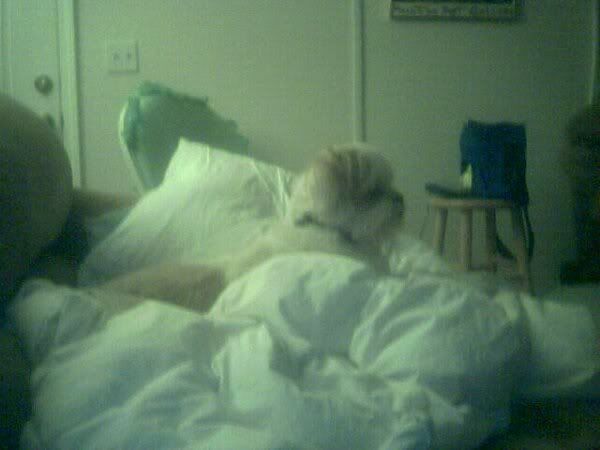
This one more recently:

And this past December, her last snow:
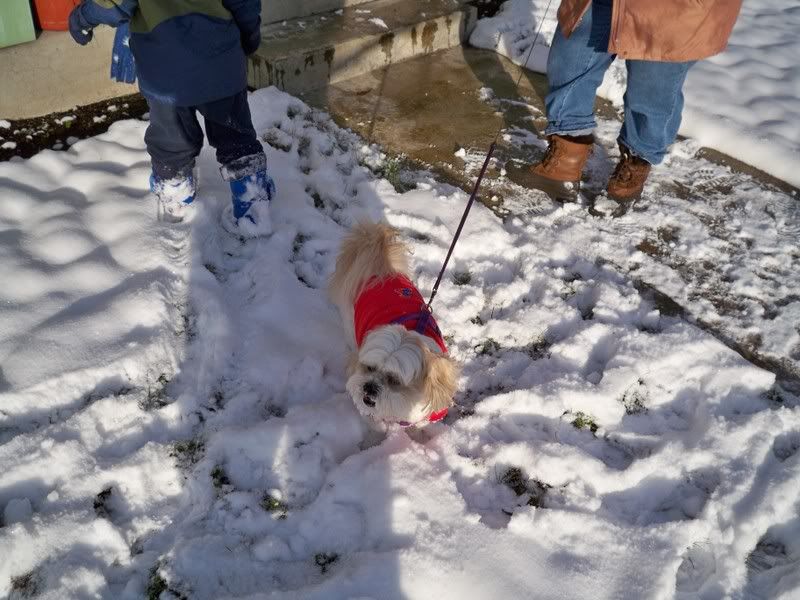
This one was taken when The Lad was The Wee Bairn:

This one more recently:

And this past December, her last snow:

Cold Comfort
"Like one who takes off a garment on a cold day, or like vinegar on soda, Is he who sings songs to a troubled heart."
- Proverbs 25:20 (NASB)
Sorry to continue on a down note, but the posts on my dad and LBD have me reflecting on something -- particularly the nature of mourning, especially for a Christian. It started following the death of my father -- I remember feeling guilty about being so sad, especially since, as a believer, I was (and remain) sure that my father's spirit lives on. in a different way, but with the same assumption of comfort, I've been reminded today (by a well-meaning vet tech) that Miko's suffering is over and she is no longer feeling anything.
But in both cases, the point is missed. I no longer feel sorry for her, and never did for my father. I felt, and feel, sorry for myself. I mourn their loss not in the sense of them having lost their lives, but in the sense of me losing them.
When my father passed, similarly well-meaning people told me, "at least you know where he is". And I remember thinking, "yes, and I also know where he isn't. He isn't here".
Life goes on -- some of us believe it even goes on for those who have left this world, and we carry with us the hope of seeing them again. But in the meantime, we have to muddle through this world without them.
That's the reason for our tears.
- Proverbs 25:20 (NASB)
Sorry to continue on a down note, but the posts on my dad and LBD have me reflecting on something -- particularly the nature of mourning, especially for a Christian. It started following the death of my father -- I remember feeling guilty about being so sad, especially since, as a believer, I was (and remain) sure that my father's spirit lives on. in a different way, but with the same assumption of comfort, I've been reminded today (by a well-meaning vet tech) that Miko's suffering is over and she is no longer feeling anything.
But in both cases, the point is missed. I no longer feel sorry for her, and never did for my father. I felt, and feel, sorry for myself. I mourn their loss not in the sense of them having lost their lives, but in the sense of me losing them.
When my father passed, similarly well-meaning people told me, "at least you know where he is". And I remember thinking, "yes, and I also know where he isn't. He isn't here".
Life goes on -- some of us believe it even goes on for those who have left this world, and we carry with us the hope of seeing them again. But in the meantime, we have to muddle through this world without them.
That's the reason for our tears.
Chew Toys in Paradise
"Every pet is a little tragedy waiting to happen"
-George Carlin
We lost Little Big Dog today. She was just a few months short of being 7 years old. She developed a serious case of AIHA (also called IMHA), an autoimmune disease in which her body's immune system attacked her own red blood cells. She wasn't getting oxygen to her body, and the waste wasn't flushing out. The vet told us her chances of surviving were very slim, and she was suffering, so we decided to have her put down.
I remember the day we got her. We had just recently moved into an apartment after months struggling to get on our feet following our move back to Oregon. We'd talked about a dog for years, but our income and living situation had not allowed it. We were for the first time in almost 2 years both gainfully employed, and living in a place that allowed pets. It was tax season, and we had a modest refund coming. TFR began searching the paper for ads, and one day she called me at work. A family living in Elmira had a litter of Lhasa Apso puppies, and was only asking $250 for them. She was headed over there to look, and would call me back. She did, informing me that she had found a pup she liked, and wanted to pick me up after work and take me out there to see it. On our way out, I made it clear that we would LOOK at the dog, but that we would not buy until we had discussed it.
Well, that didn't last long. We got to the farmhouse, and the woman put this tiny puppy in my hands. I took one look at the dog, one at my wife, one more at the dog, and got out my check book.
Her breed wasn't supposed to like kids, but she was potty trained while living in an apartment complex, and every time we took her out, the kids would gather round, and she adored kids her whole life. In fact, she got along with just about everyone, except select other dogs -- especially Onyx, her nemesis, a black mutt who gets walked past here regularly. She was more aggressive the bigger the dog. In fact, the only thing that really scared her was... I kid you not... houseflies. She would hide from them under our legs and tremble. She hated being on a leash, loved the outdoors, but seldom got to go off a leash, because she didn't get along with other dogs at the dog park.
She never acted like a small dog -- she was feisty and loved to play rough, loved to chase balls, liked to try to carry sticks that weighed almost as much as her. She was the best dog I ever had. She was loyal, obedient (usually) and affectionate. She was also very good with The Lad -- she put up with a lot of harassment from him, and they developed an almost sibling-like relationship. She loved him. Even today, as she lay helpless in my lap, waiting for him and TFR to return from his daycare so he could say goodbye, just the sound of his name perked her up momentarily.
We stayed with her until the end. It was one of the hardest things I've ever done in my life, but it was the right thing to do. She'd given us almost 7 years of unconditional love, the least we could do was end her suffering and comfort her during her passing. It took just a few seconds... one last sigh and she went to sleep forever.
Goodbye, Miko. Run free in Heavens fields -- no more leash for you.
-George Carlin
We lost Little Big Dog today. She was just a few months short of being 7 years old. She developed a serious case of AIHA (also called IMHA), an autoimmune disease in which her body's immune system attacked her own red blood cells. She wasn't getting oxygen to her body, and the waste wasn't flushing out. The vet told us her chances of surviving were very slim, and she was suffering, so we decided to have her put down.
I remember the day we got her. We had just recently moved into an apartment after months struggling to get on our feet following our move back to Oregon. We'd talked about a dog for years, but our income and living situation had not allowed it. We were for the first time in almost 2 years both gainfully employed, and living in a place that allowed pets. It was tax season, and we had a modest refund coming. TFR began searching the paper for ads, and one day she called me at work. A family living in Elmira had a litter of Lhasa Apso puppies, and was only asking $250 for them. She was headed over there to look, and would call me back. She did, informing me that she had found a pup she liked, and wanted to pick me up after work and take me out there to see it. On our way out, I made it clear that we would LOOK at the dog, but that we would not buy until we had discussed it.
Well, that didn't last long. We got to the farmhouse, and the woman put this tiny puppy in my hands. I took one look at the dog, one at my wife, one more at the dog, and got out my check book.
Her breed wasn't supposed to like kids, but she was potty trained while living in an apartment complex, and every time we took her out, the kids would gather round, and she adored kids her whole life. In fact, she got along with just about everyone, except select other dogs -- especially Onyx, her nemesis, a black mutt who gets walked past here regularly. She was more aggressive the bigger the dog. In fact, the only thing that really scared her was... I kid you not... houseflies. She would hide from them under our legs and tremble. She hated being on a leash, loved the outdoors, but seldom got to go off a leash, because she didn't get along with other dogs at the dog park.
She never acted like a small dog -- she was feisty and loved to play rough, loved to chase balls, liked to try to carry sticks that weighed almost as much as her. She was the best dog I ever had. She was loyal, obedient (usually) and affectionate. She was also very good with The Lad -- she put up with a lot of harassment from him, and they developed an almost sibling-like relationship. She loved him. Even today, as she lay helpless in my lap, waiting for him and TFR to return from his daycare so he could say goodbye, just the sound of his name perked her up momentarily.
We stayed with her until the end. It was one of the hardest things I've ever done in my life, but it was the right thing to do. She'd given us almost 7 years of unconditional love, the least we could do was end her suffering and comfort her during her passing. It took just a few seconds... one last sigh and she went to sleep forever.
Goodbye, Miko. Run free in Heavens fields -- no more leash for you.
Sunday, January 18, 2009
Keeping Eternal Watch
I've had a request from one of my readers for pictures from our trip to San Diego. Most of the pictures include TFR, The Lad, and friends, and due to privacy concerns, I won't be sharing them here on the blog. That reader, however, is one of TFR's best friends, so Wanda, we'll be sending you pics.
However, I did want to share one set of pictures from the trip. While I was there I spent an afternoon at Fort Rosecrans National Cemetary, visiting my father's grave:
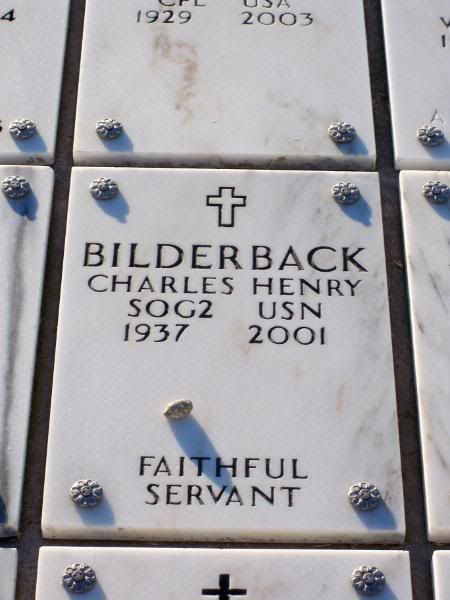
It was the first time since we buried him there that I've had time to really spend time there -- when we went down to bury my grandmother, there just wasn't time. So this time, we spent a good amount of thime there, making sure it was cleaned up and leaving flowers:

I also asked TFR to take the Lad away so I could spend some time alone with my dad. I know he's not there, but it helped a lot to have a place where I could connect with my memories of him. My father was the best friend I ever had, the best man I ever knew, and by far and away my hero. My life has never quite been the same since he died. It was good to talk to him, to weep for him, and to let myself face the loss.
But my father loved serving in the U.S. Navy, probably as much as anything else he did in his very busy life, so I'm convinced he would have loved knowing that he was up on Point Loma, keeping eternal watch on the shores of the country he loved. In fact, as I reflected on his final resting place, I had two thoughts that gave me some consolation:

He has a great view, and...
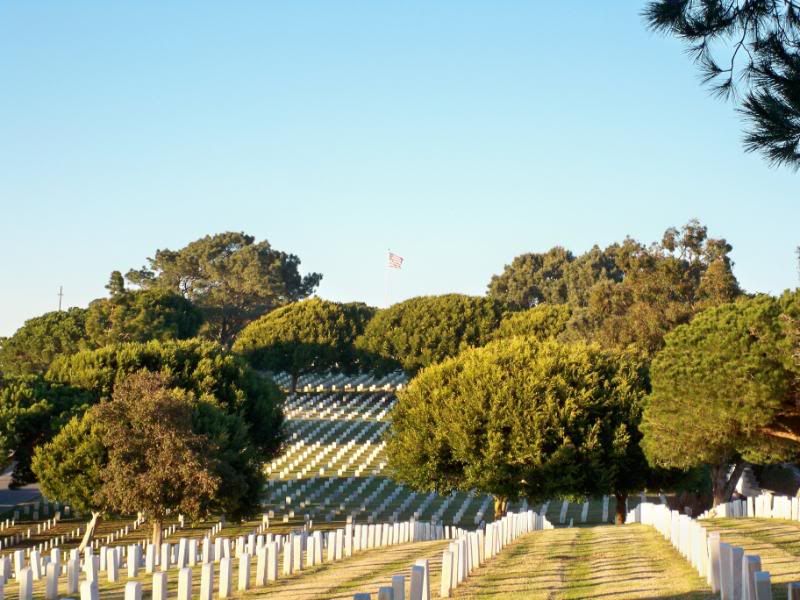
He's in really good company.
However, I did want to share one set of pictures from the trip. While I was there I spent an afternoon at Fort Rosecrans National Cemetary, visiting my father's grave:

It was the first time since we buried him there that I've had time to really spend time there -- when we went down to bury my grandmother, there just wasn't time. So this time, we spent a good amount of thime there, making sure it was cleaned up and leaving flowers:

I also asked TFR to take the Lad away so I could spend some time alone with my dad. I know he's not there, but it helped a lot to have a place where I could connect with my memories of him. My father was the best friend I ever had, the best man I ever knew, and by far and away my hero. My life has never quite been the same since he died. It was good to talk to him, to weep for him, and to let myself face the loss.
But my father loved serving in the U.S. Navy, probably as much as anything else he did in his very busy life, so I'm convinced he would have loved knowing that he was up on Point Loma, keeping eternal watch on the shores of the country he loved. In fact, as I reflected on his final resting place, I had two thoughts that gave me some consolation:

He has a great view, and...

He's in really good company.
Subscribe to:
Posts (Atom)

